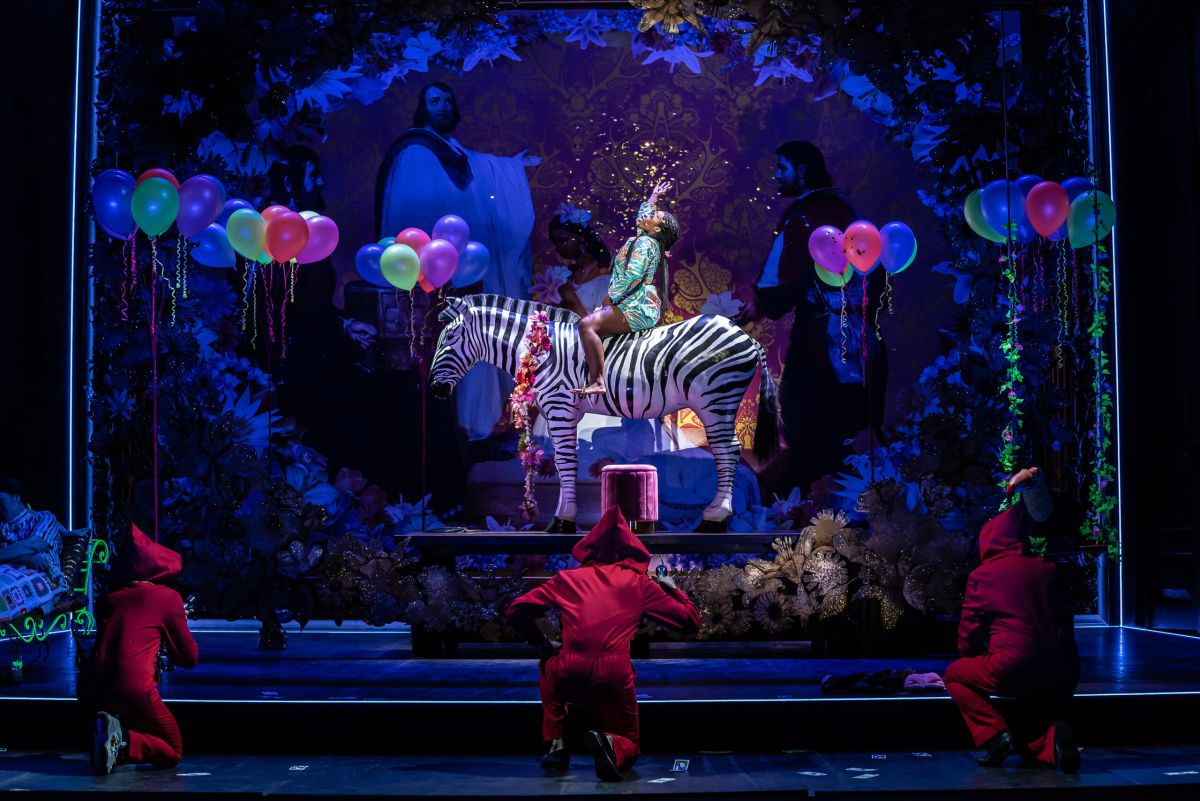Review: Opera North’s Rigoletto

Written by Maria Plakhtieva
If only I’d knew Italian, I would have come back to see the opera in all its glory!
This was my first time watching Rigoletto. I knew that Femi Elufowoju Jr’s opera-directing debut would be modern. Despite that, my first reaction was that it was too modern for the original libretto and music of the opera. In brief moments I was able to disconnect myself from the gripping performance on stage, I wasn’t able to imagine anything better than 16th century costumes
and decorations. However, in this production, sixteenth century court attire was replaced by a variety of traditional African costumes featuring a colourful palette of casual shirts, blouses and dresses. Nonetheless, looking back on this adaptation a couple of days later, I realise that it was my only gripe with an otherwise incredible production.
Certainly, some people might find this reimagination of the setting brilliant and avant-garde. I just wasn’t one of them. In spite of that, the stars of this performance are, without a doubt, the singers. Rigoletto (the court jester), played by Eric Greene, moves away greatly from the stereotypical Rigoletto. Tall, with handsome features, muscular, and with a resounding baritone, he is a total contradiction to an initially described ugly little man with a hunched back. Strangely, this evoked even deeper and stronger feelings for Rigoletto’s fate, making me wonder whether this was a deliberate comment on the importance that we as a society place on the feelings of the more “conventionally” attractive members.
The feelings which arise during the play are not pity or sympathy, but fear and recognition of a disconcerting, surreal reality. Rigoletto’s actions are exaggerated, especially when he starts believing that he was cursed but there is still the glimpse of a struggle with his rational mind who tells him that it can’t be true. However, these actions mirror reality better than ever. One can recognise him struggling about an important decision, weighing the various outcomes and catching himself just as an unpleasant thought crosses his mind. Just then, he realises that the thought shouldn’t have occurred because it wasn’t rational but even he is helpless and overwhelmed by his emotional reaction.
This tussle between the rational and the emotional mind strikes close to home when one realises that the cause of his apprehension and unease is his daughter, Gilda. Gilda, played by Jasmine Habersham, is a complete opposite of her father’s. Her clear soprano voice, infinitely enchanting, left me completely mesmerised by her extensive vocal range and masterful control over the vocal cords. Gilda’s character was supposed to be an innocent, pure representation of a girl, who lives in a very different world from that of her father and the Duke’s. This idea was definitely well preserved by (even though still modern) decorations and costumes.
The moment when she comes out of the Duke’s room made the audience chuckle about her appearance – long. white dress, and huge hair with a bow. One can’t help but smile at this moment even though Gilda herself seemed to be embarrassed and humiliated. The audience’s reaction pointed my attention to the fact that she does not belong to the debauched world of the Duke, Rigoletto, and others, and this was incorporated in the setting quite well.
The third main character – or tritagonist – is the Duke, played by the Russian tenor Roman Arndt. If I were to draw an analogy between his character and the real world, I would say that instead of a princely, noble man, he appears to the audience as an easygoing, vain and hedonistic artist, while all his valets play the role of his lackeys, trying to curry favour with such a “celebrity”. When I observed the Duke in this performance, I had the constant feeling that his attitude towards reality was as if it is all a farce, a jape and not worth taking seriously.
Nonetheless, despite the excessive modernity, I enjoyed watching this opera, and even though I don’t know Italian (the English subtitles surely helped), I was pleased with the performance. Three things that I vividly remember are Rigoletto’s emotions, Gilda’s voice, and the Duke’s playful character. Another thing I realize, looking back, is that after the opera, I went home murmuring ‘La donna è mobile’, which is quite cheerful, and, at the same time, reminiscent of a grim and depressing scene from the play when this song is sang. As noted by Cormac Newark: ‘La donna è mobile’ appears to be an unfortunate theme song for the opera – it is brash where other parts of the work are subtle, cheerful where they are gloomy. Moreover, it seems to be totally out of place in the proposed modern setup. But surprisingly, the combination of this dark scenery and mischievous melody expresses the whole emotional complexity of the opera.
Without revealing anymore details, I would advise you to go to this opera if you want to enjoy the mixture of implicit current problems and ridiculous scenes, our emotional vulnerability and at the same time relish the excellent acting and singing. As the show ends, I can assure you, you too will be moved by Rigoletto’s plight, recognize how his fatherly love superseded everything else in him, and how ideas and principles from nearly two centuries ago can still be perfectly incorporated into our own day and age.
Rigoletto played at the Lowry for two nights only but tours the UK until 1st April – you have a fortnight left to see it!







